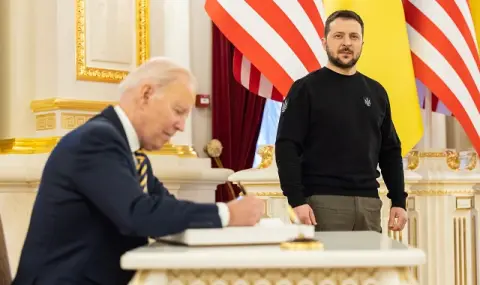Ukraine President Volodymyr Zelensky is running into trouble with his expectations of an invitation to join NATO as some of the alliance's key members are reluctant to let it happen as it would be drawn into a war with Russia.
In an interview with POLITICO, outgoing US Ambassador to NATO Julian Smith underscores the American position. "To date, the Alliance has not reached the point where it is ready to offer membership or an invitation to Ukraine," she said.
Germany and the US are among the major powers slow to heed Zelensky's call for an immediate invitation to join NATO, according to four US and NATO officials and diplomats who spoke on condition of anonymity to share recent internal discussions.
p>
In his Victory Plan, Zelensky demanded an immediate invitation, but admitted that actual joining the alliance would only be possible after the end of the war with Russia. Zelensky insisted this week that it is "fundamental" for Ukraine "to receive an invitation during the war".
Zelensky admitted that German Chancellor Olaf Scholz - a major military supplier to Ukraine, with weapons supplies second only to America - would not support him for a quick invitation to join NATO.
"I have a very good relationship with Scholz. I am grateful that Scholz is helping. Germany is second in terms of support, Zelensky told reporters earlier this week. But it is a fact that the German side is skeptical about our joining NATO. We will all have to work a lot with the German side. But nevertheless, the United States will have an influence on it."
Hungary and Slovakia are also resisting, but for different reasons. Their current leaders take a generally pro-Kremlin line, such as Hungarian Prime Minister Viktor Orbán, who blocked EU funds for arming Ukraine and quit NATO's program to send lethal aid to Kiev.
In a post on social media, Orban called Zelenskiy's victory plan "more than terrifying".
Robert Fico of Slovakia warned earlier this month that letting Ukraine join NATO "would be a good basis for a third world war" and promised that he would "never agree" with that.
There are other countries that are unwilling to act quickly on Kiev's request, but are "hiding in the shadows".
"Countries like Belgium, Slovenia or Spain are behind the USA and Germany. They are reluctant,'' one NATO official said. A second official said the parties "support it in the abstract, but as it gets closer to materializing," they will begin to oppose the idea more publicly.
This puts them at odds with countries like the Baltics and Poland, which are more enthusiastic.
Poland is in favor of "opening a NATO perspective for Ukraine,", Polish Prime Minister Donald Tusk said at a summit of EU leaders last week. "That hasn't changed. In this regard, we stand in solidarity with Ukraine.
